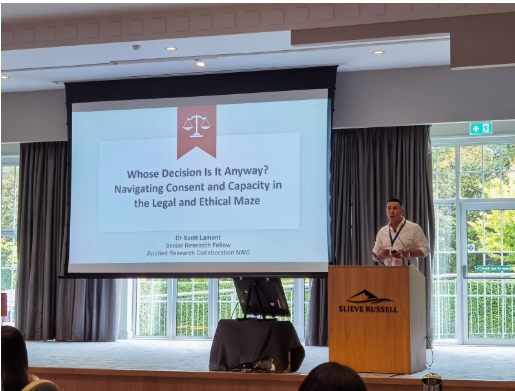Scott delivers keynote speech to nurses and midwives

Scott Lamont, Senior Research Fellow with the Implementation and Capacity Building Team at the Applied Research Collaboration North-West Coast, was invited to be the keynote speaker at the Irish Nurses and Midwives Organisation (INMO) Annual Operating Theatres sub-section conference in Cavan, Ireland, on October 5th. His talk focused on consent and decision-making capacity in healthcare, a topic of significant relevance with the recent enactment of the Assisted Decision-Making (Capacity) Act 2015 in Ireland.
In his presentation, titled “Whose Decision Is It Anyway? Navigating Consent and Capacity in the Legal and Ethical Maze” Scott shared insights from his research, including work from his PhD, which has examined the complexities of how decision-making capacity is understood and assessed in clinical settings. With the new legislation, Irish healthcare professionals face fresh considerations around patient autonomy, supported decision-making, and the legal frameworks surrounding capacity and consent.
Scott highlighted the Act’s key provisions, such as the presumption of capacity, the functional approach to capacity assessment, the promotion of supported decision-making models, and an emphasis on will and preferences. He also discussed the importance of advance healthcare directives and the legal right of individuals to refuse treatment, provided they have the capacity for such refusals.
A key part of the presentation was introducing the CARD (Comprehend, Appreciate, Reason, Decide) approach, a tool he developed with colleagues to support healthcare professionals in assessing a patient’s capacity to make informed decisions. This framework satisfies legal requirements and ensures that patients understand their condition, the proposed treatments, and the risks involved, allowing them to make decisions in line with their values and preferences.
Scott also touched on some of the broader ethical considerations that underpin consent and capacity, including autonomy, beneficence, non-maleficence, and justice. These ethical principles help guide healthcare workers in balancing respect for patient choices with their duty of care, especially in complex cases.
Scott concluded by discussing the legal risks associated with inadequate attention to consent and capacity, such as negligence and trespass to the person, emphasising the importance of proper training and education for healthcare professionals to ensure they meet their legal and ethical obligations.
“Being invited to speak at the INMO conference was a fantastic experience. It was a great opportunity to share my work, especially as Ireland takes such a progressive step with the new legislation. It was great to and explore how the legislation will impact practice and patient-centred models of care, and the conversations I had with conference attendees were insightful and inspiring. It was a pleasure to be a part of it.”